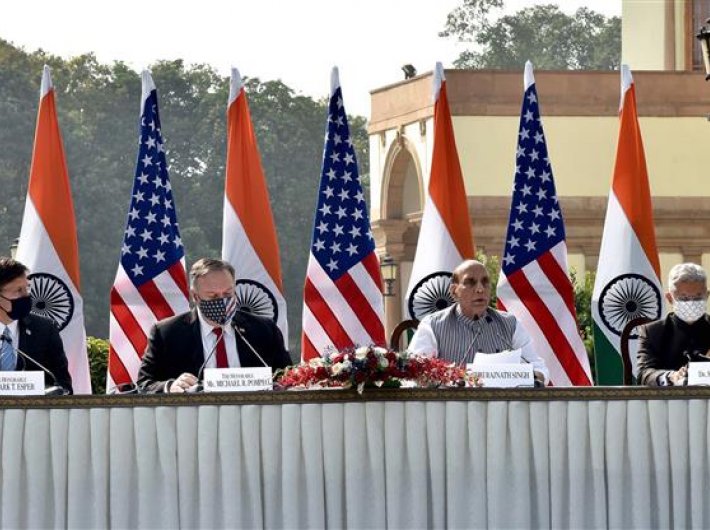Next American president not expected to do anything to jeopardise bilateral relations
The India-US two-plus-two ministerial dialogue, concluded late last month, has once again reaffirmed the two countries’ commitment to strengthen their bilateral engagement and work for peace and tranquility in the Indo-Pacific region. As it was held against the backdrop of a bitter standoff between India and China in eastern Ladakh, the two countries during their 3rd two-plus-two dialogue focused their agenda on China’s designs and its emergence as a threat to the democratic world.
However, what the development overall showed was that the deadly nature of the Covid-19 virus could not deter secretary of state Mike Pompeo and defence secretary Mark T Esper from making their physical presence, nor the demand of the US presidential campaign for the November 3 election held them back from stepping out of their country when they decided to visit India during October 26-27.
It was not that India and the US would have not managed to hold this format of meeting between them through video conferencing. India has already held highly important annual summits with Australia, Japan and the European Union in a virtual format. Also, there have been several plurilateral or multilateral groups, including those of the SAARC and G-20, which have held their leadership summits in a virtual format. Despite such precedents, if both India and the US decided to hold their meet physically, the China factor must be accounted for being the key reason for such developments.
Seen as an elephant in the room, China’s aggressive push in South Asia, Southeast Asia and the South China Sea rattled the democratic world. The June 15 Galwan Valley incident in which 20 Indian soldiers were killed by the People’s Liberation Army left the international community shell-shocked and forced it to take China as a threat to peace and stability in the entire Indo-Pacific region.
It was against this background that India and the US decided to have their annual two-plus-two dialogue by sitting face to face in New Delhi and draw a roadmap to counter the danger coming from Xi Jinping-led China. Four broad outlines were drawn during the dialogue to stem Beijing’s aggressive design and they were in the domain of geopolitics, defence and security, intelligence and satellite data sharing and economic cooperation.
Though details of each domain will be worked out by the officials of India and the US, all democratic countries falling in the Indo-Pacific region will be sensitised about dangers posed by China. Especially smaller countries which always look at China for financial assistance will be asked to lessen their dependence on Beijing. India together with the US and two other Quad members will fund infrastructure and capacity building projects in the less developed countries of the Asia-Pacific region.
Aim is to wean countries of the region away from Beijing by assuring them financial, political and strategic help. In countries like Maldives, Sri Lanka, Indonesia and Vietnam, both India and the US will increase their strategic footprints. In Maldives, for example, the US does not have an embassy, and will open one in this highly important Indian Ocean country.
And then to advance shared security interests in the Indo-Pacific region, there would be an increased military interaction between India and the US and the signing of the last and final foundational agreement BECA (Basic Exchange and Cooperation Agreement) during the two-plus-two dialogue has made it amply clear.
At the bilateral level, New Delhi asked Washington DC to have increased military-to-military engagement through joint training, exercises and exchange of experts. The Military Cooperation Group (MCG) dialogue which is expected to be held in November in the US, will review bilateral military-to-military relations and there, all issues related to joint training exercises will be taken up.
During the meeting, India also asked for the fast-tracking of joint defence collaboration in the field of critical technologies like drones, high-caliber rifles, fighter planes, missiles, night-vision devices and other equipment. India has invited the US to participate in the Aero-India programme to be held in February 2021.
Closeness of India and the US will be of significant help to New Delhi in countering Beijing fomented anti-India activity in Nepal and other countries of the region. Indian diplomats and security agencies are confident that they will be successful in quelling any move that could be prejudicial to India. The same confidence is, however, not seen with regard to Pakistan which is committed to do what China asks it to do.
But then, the growing bonhomie between India and the US has shown it explicitly that both need each other to take on challenges from China. As such, whosoever is the next US president, he will do nothing to jeopardise India-US relations or change fundamental action plans in the Indo-Pacific region at the cost of international rules order, peace and prosperity.



